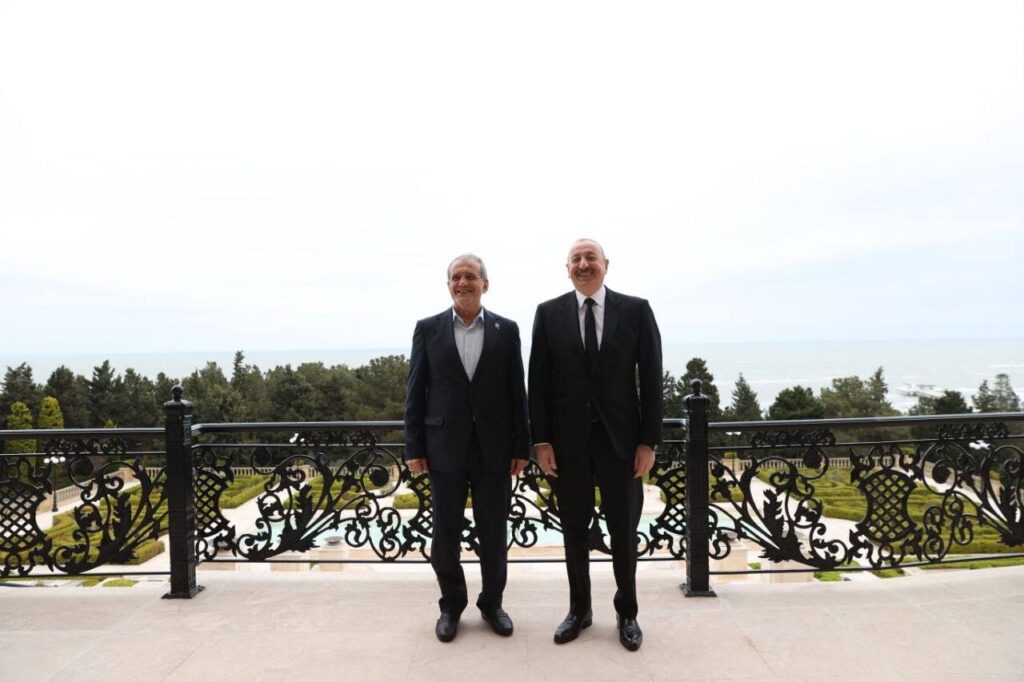TEHRAN – When Iranian President Masudo Pezeshkian landed in Baku on Monday, his visit led to seven signed cooperation agreements.
As the two countries deepen their strategic ties, the obvious uncertainty of the Israeli regime – exclusively by Prime Minister Netanyahu’s hastily announced pursuit visit to Azerbaijan – bares the truth often obscured by geopolitical stance. This is not just diplomacy, it is calculation.
Liberation of Israel’s Pan Turkist Gambit
For years, Tel Aviv has positioned Azerbaijan as a lynchpin in its campaign to “contain Iran” and leveraged weapons sales (providing more than 60% of Baku’s defensive imports since the 1990s) and intelligence sharing facilities near the Iranian border.
The central part of this strategy was to amplify the narrative of Pan Tarkist, an ideology that promotes unity among Turkish-speaking countries, in order to drive the wedge between Baku and Tehran.
However, as Pezeschkian pointed out during his visit, such efforts ignore the unchanging reality. Iran and Azerbaijan are “bound to brotherhood, friendship and family ties, and Shia traditions and Persian cultural heritage have grown for centuries.
The 2020 Nagorno-Karabakh conflict revealed the limitations of this division and the Rules approach. Azerbaijan celebrated its military success with alleged support from Turkey and Israel, but subsequent regional instability underscored the risk of relying on external stakeholders.
In contrast, Iran has established itself as a practical mediator and defends lasting peace. This is a stance that resonated in Baku when the reconstruction challenges were placed.
Brenda Shaffer and the Industry of the Sectors
Israeli scholar Brenda Schaffer symbolizes this intellectual arm of foreign interference. Her work, in particular, the borders and brothers of the 2002 book, have long been weaponized to frame Azerbaijani identity against Iran, which has coexisted for centuries.
By making absurd allegations such as “cultural genocide” against Iranian Azerbaijanis, Iranian Azerbaijanis are allegations that have been countered by millions of Iranian Azerbaijanis, and Schaffer’s rhetoric served as an excuse for sanctions campaigns and separatist provocations.
Furthermore, those who share her views with Shaffer are unable to recognize that Iran’s identity, rooted in one of the world’s oldest civilizations, transcends narrow ethnic and racial sectors. Imposing a European framework to interpret Iran not only misrepresents its rich cultural tapestry, but also undermines a reliable analysis of the country’s multifaceted heritage.
However, the visit of Pezeschkian dismantled these stories. His meeting with President Ilham Aliyev highlighted cultural synergies.
From friction to pragmatism: security beyond proxy
Skeptics often cite cases like the 2023 incident at the Azerbaijan embassy in Tehran as evidence of irreparable tension. However, both countries intentionally avoided such flare-ups in order to prioritize shared interests.
Collaboration on border security, counter-terrorism and other issues reflects a practical understanding. Regional stability cannot be outsourced.
For Azerbaijan, the partnership reduces Türkiye and Israel’s reliance on security assurances and strengthens its autonomy.
In Iran, it secures the northwest flank while countering US-led sanctions through increased trade.
Netanyahu’s anachronistic counter play
Israel’s uncertainty is clear. Once Azerbaijan can be positioned as a “listening post” to Iran, Tel Aviv is now seeing Baku negotiating directly with Tehran on everything from Caspia’s pollution to the passage corridor.
The proposed Zangezur route (transport link connecting Azerbaijan to Turkey) was initially promoted as a Panturkic project, excluding Iran.
Currently, Tehran’s involvement in consultations highlights severe changes. Azerbaijan no longer requires Israel as an intermediary.
Netanyahu’s announced visit feels increasingly desperate.
Meanwhile, Iran is focusing on infrastructure, including expanding its North-South Transport Corridor and connecting the Caucasus to the Persian Gulf, threatening to alienate Israel’s “peripheral doctrines.”
Furthermore, Ayatollah, in consultation with Pezeshkian and the leaders of the Islamic Revolution, made Ali Khamenei ay, but before the trip it was not merely a form.
“We stressed the need to deepen and strengthen relations between the two countries,” the Iranian president said of his meeting with his leader before visiting Bak.
Israel’s scramble to reaffirm the influence exemplified by Netanyahu’s reactive diplomacy highlights an era of decline. The Caucasus no longer needs a translator. In Baku and Tehran, the future is written in the language of relatives who are struggling to understand by outsiders.

